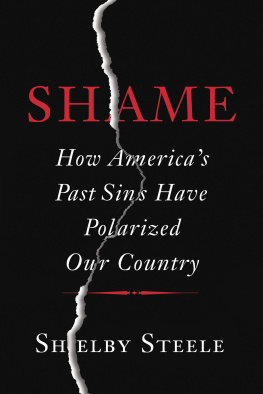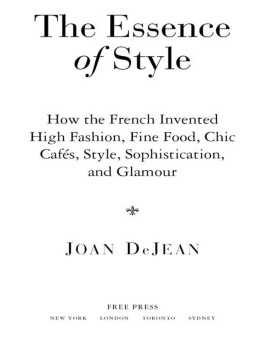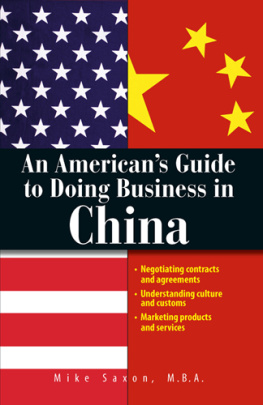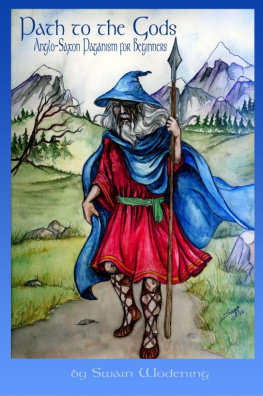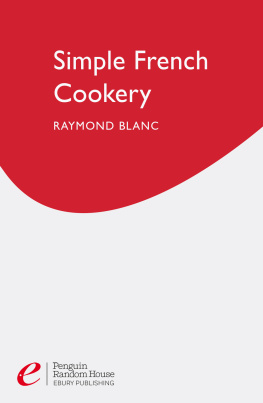THE FRENCH WAY

The Keys to the Behavior, Attitudes,
and Customs of the French
THE FRENCH WAY
Second Edition
R OSS S TEELE
Recipient of France's highest award, The Lgion d'Honneur


Copyright 2006 by McGraw-Hill Companies, Inc. All rights reserved. Manufactured in the United States of America. Except as permitted under the United States Copyright Act of 1976, no part of this publication may be reproduced or distributed in any form or by any means, or stored in a database or retrieval system, without the prior written permission of the publisher.
0071487182
The material in this eBook also appears in the print version of this title: 0-07-142807-0.
All trademarks are trademarks of their respective owners. Rather than put a trademark symbol after every occurrence of a trademarked name, we use names in an editorial fashion only, and to the benefit of the trademark owner, with no intention of infringement of the trademark. Where such designations appear in this book, they have been printed with initial caps.
McGraw-Hill eBooks are available at special quantity discounts to use as premiums and sales promotions, or for use in corporate training programs. For more information, please contact George Hoare, Special Sales, at george_hoare@mcgraw-hill.com or (212)904-4069.
TERMS OF USE
This is a copyrighted work and The McGraw-Hill Companies, Inc. ("McGraw-Hill") and its licensors reserve all rights in and to the work. Use of this work is subject to these terms. Except as permitted under the Copyright Act of 1976 and the right to store and retrieve one copy of the work, you may not decompile, disassemble, reverse engineer, reproduce, modify, create derivative works based upon, transmit, distribute, disseminate, sell, publish or sublicense the work or any part of it without McGraw-Hill's prior consent. You may use the work for your own noncommercial and personal use; any other use of the work is strictly prohibited. Your right to use the work may be terminated if you fail to comply with these terms.
THE WORK IS PROVIDED "AS IS." McGRAW-HILL AND ITS LICENSORS MAKE NO GUARANTEES OR WARRANTIES AS TO THE ACCURACY, ADEQUACY OR COMPLETENESS OF OR RESULTS TO BE OBTAINED FROM USING THE WORK, INCLUDING ANY INFORMATION THAT CAN BE ACCESSED THROUGH THE WORK VIA HYPERLINK OR OTHERWISE, AND EXPRESSLY DISCLAIM ANY WARRANTY, EXPRESS OR IMPLIED, INCLUDING BUT NOT LIMITED TO IMPLIED WARRANTIES OF MERCHANTABILITY OR FITNESS FOR A PARTICULAR PURPOSE. McGraw-Hill and its licensors do not warrant or guarantee that the functions contained in the work will meet your requirements or that its operation will be uninterrupted or error free. Neither McGraw-Hill nor its licensors shall be liable to you or anyone else for any inaccuracy, error or omission, regardless of cause, in the work or for any damages resulting therefrom. McGraw-Hill has no responsibility for the content of any information accessed through the work. Under no circumstances shall McGraw-Hill and/or its licensors be liable for any indirect, incidental, special, punitive, consequential or similar damages that result from the use of or inability to use the work, even if any of them has been advised of the possibility of such damages. This limitation of liability shall apply to any claim or cause whatsoever whether such claim or cause arises in contract, tort or otherwise.
DOI: 10.1036/0071428070

Want to learn more?
We hope you enjoy this McGraw-Hill eBook! If you'd like more information about this book, its author, or related books and websites, please .
CONTENTS
PREFACE TO THE SECOND EDITION
.
This is a completely revised edition of The French Way, covering events including the May 2005 referendum in which the French rejected the proposed constitution for the European Union and the rioting that lasted three weeks in the suburbs of Paris and other major French cities in October and November 2005.
The number of articles has increased from eighty-five to ninety. All of the original articles have been revised and updated to include, among other recent events, the opening of the magnificent Viaduc de Millau; the launch of the world's largest passenger plane, the 555-seat, double-deck Airbus 380; and the beginning of the free digital television network TNT. Among the new articles are Vive la diffrence! and Population, which gives a detailed overview of French society based on the 2004 census.
INTRODUCTION
.
In Thomas Jefferson's opinion, "Every man has two countries: his own and France." France's cities, villages, and picturesque countryside, her medieval cathedrals, castles, and art museums, her restaurants, high-fashion and luxury goods are admired throughout the world. But who are the French? Foreigners have many different views of them, both positive and negative.
This book takes a new look at today's French society through some characteristic French behaviors, attitudes, and customs. During recent times, many traditional French values have been buffeted by the winds of change, which have produced deep tensions within the social groups caught up in the process of modernization, the greater influence of the European Union on daily life, and the globalization of economic forces. The tension between nationalism and internationalism, for example, has erupted onto the world stage as France has adopted an independent position in political and economic debates in international forums. This has led to criticisms of French arrogance. On the other hand, France has consistently pursued a policy of promoting world peace, humanitarian aid through the NGO Mdecins Sans Frontires (Doctors Without Borders), and economic aid programs by wealthy nations in developing countries.
Foreigners looking at France from the viewpoint of their own cultural values often misunderstand French reactions and perceive contradictions in the collective behavior of the French. This book helps to clear up such misunderstandings by placing French behavior and attitudes in their own context and explaining why long-standing traditions within France give coherence to French reactions when seen from within their society. Readers will acquire greater awareness of similarities and differences between their cultural traditions and those of the French. This knowledge will increase their capacity to communicate appropriately with the French and enjoy their company. On a personal level, the French can be the most charming of acquaintances and the most loyal of friends. Above all, they are individuals in a country where individualism is a national characteristic.
Alexis de Tocqueville wrote in 1865 that "The French are both the most brilliant and most dangerous of all European nations, and the best qualified to become, in the eyes of other peoples, an object of admiration, hatred, compassion, or alarmnever of indifference." Many foreigners today still share this opinion. The French continue to surprise, frustrate, amuse, and stimulate the world.
Next page



